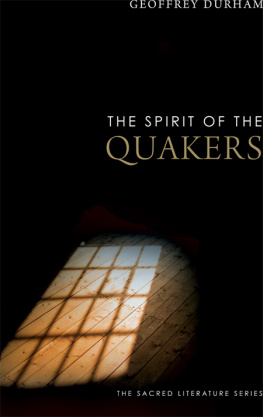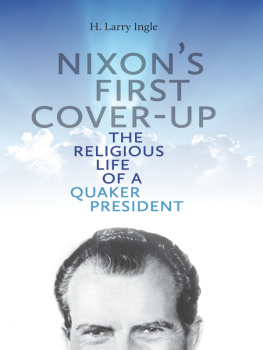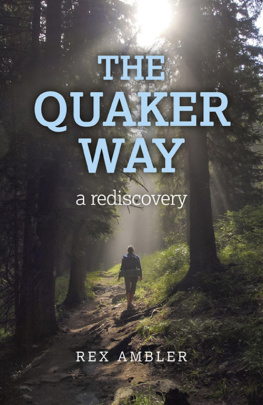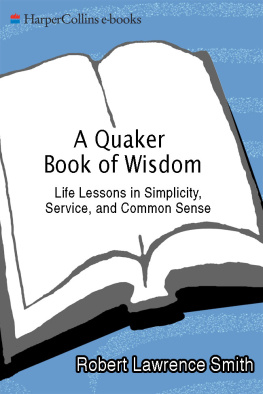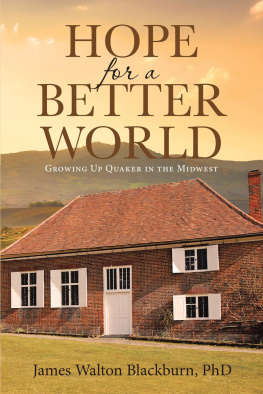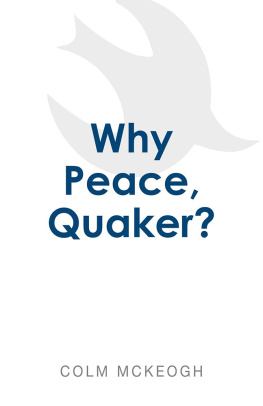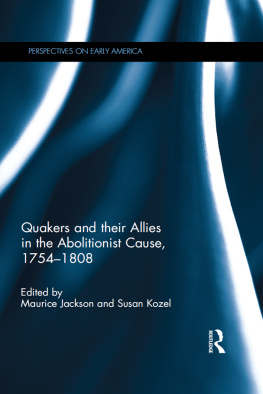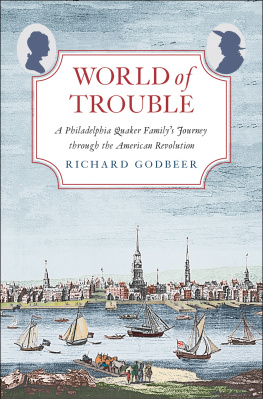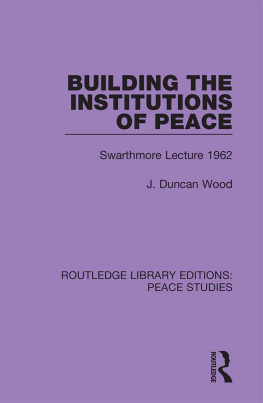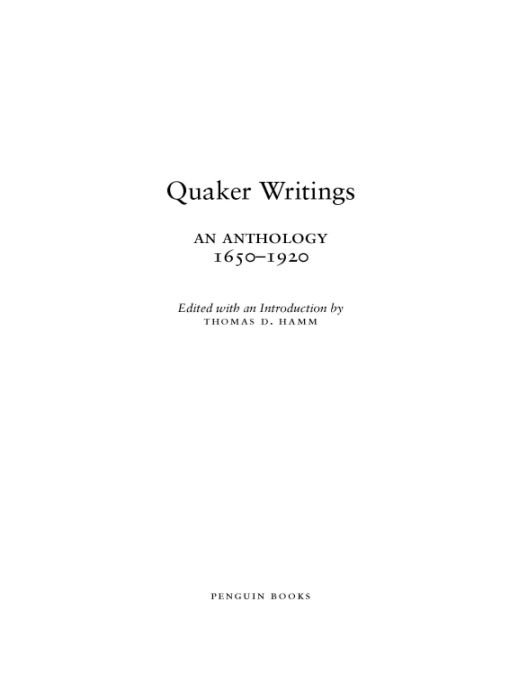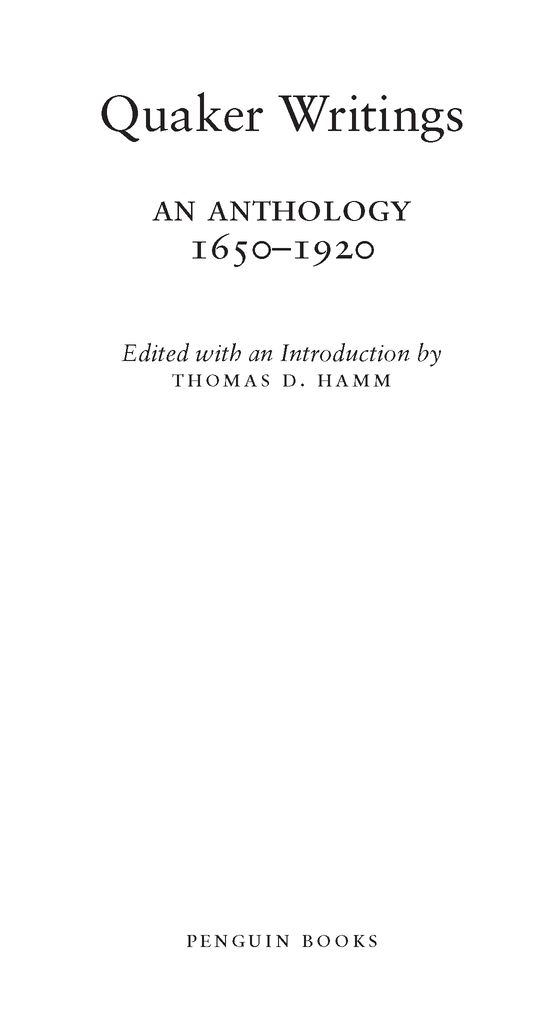Table of Contents
QUAKER WRITINGS
THOMAS D. HAMM is professor of history and archivist/curator of the Friends Collection at Earlham College. A native of New Castle, Indiana, he received his Ph.D. in history from Indiana University in 1985. After teaching two years at Indiana University-Purdue University-Indianapolis, he joined the Earlham faculty. He is the author of numerous works on Quaker history, and his most recent book, The Quakers in America, was published by Columbia University Press in 2003.
Introduction
The People Called Quakers
They began amidst uncertainty, conflict, upheaval, and even personal torment. They were one of dozens of strange, sometimes bizarre sects that sprang up in England in the 1640s and 1650s, as common folkfarmers, smiths, cobblers, shopkeepers, wives, and motherstook advantage of civil war and the breakdown of government control to assert the right to seek God, read the Bible, and find truth in their own ways. In what hostile observers called a world turned upside down, both the learned and the illiterate challenged accepted orthodoxies: political, social, and religious. Yet of all the sects that flourished in this generationDiggers and Levelers, Ranters and Muggletonians, Brownists, Familists, and Fifth Monarchists, to name just a fewonly one has survived to the present day. At first it had no name, then came to refer to itself as Children of the Light, then Friends of the Light, and finally the Religious Society of Friends. Detractors labeled them Quakers, an insulting nickname that the Friends would, for the most part, eventually embrace.
The early Quaker world was one of conflict. In 1642, Great Britain was plunged into a civil war that pitted King Charles I against Parliament. Although the power of king versus Lords and Commons was central, so was religion. Charles was a staunch supporter of a state-supported, ritualistic Protestant church ruled by bishops with him at their head. Parliament was dominated by Puritans, champions of a purer, Reformed church in which bishops would be abolished and ritual would be minimal. By 1650, the king was dead and the old Church of England no longer existed. Now the terms of the religious debate shifted. Would there be a new state church along Puritan lines, or would some form of religious toleration and liberty become the rule?
Coming of age amidst this uncertainty was a young man from a Puritan family in Leicestershire, George Fox. Born in 1624, Fox was by his own account an unusually solemn, pious youth. He was tormented by the claims of the competing groups around him, convinced that if he made the wrong choice in faith, a just and jealous God would damn him. So he embarked on a kind of spiritual pilgrimage, seeking out both clergy and laypeople with reputations for piety, yet, as he put it, none spoke to my condition. By 1646, his journey took him onto the moors of Yorkshire and Lancashire. There he had a series of experiences that we today would call revelationshe called them openingsin which Fox was certain that God spoke directly to him. As he described it later: when all my hopes... were gone, so that I had nothing outwardly to help me, nor could tell what to do, then, Oh then, I heard a voice which said, There is one, even Christ Jesus, that can speak to thy condition.
Over the next few years, Foxs openings continued, laying the foundations for the Quaker movement. Key was the idea of direct revelation, that God spoke directly to human beings through the Holy Spirit, just as he had in the days of the Hebrew prophets and the apostles. While Fox was a devout student of the Biblea Friend later said that if all the Bibles in the world were somehow lost, it could be reconstructed from George Foxs memoryhe insisted that the same spirit that inspired the scriptures still inspired believers. Fox gave equal weight to the centrality of the experience of the light of Christ. This light, he argued, was inward. He wrote, every man was enlightened by the divine light of Christ, and I saw it shine through all, and they that believed in it came out of condemnation and came to the light of life, and became the children of it, but they that hated it, and did not believe in it, were condemned by it, though they made a profession of Christ. If Friends were obedient to this light within them, then they would know salvation; but if they disobeyed it, they would be damned. Radically, Fox and other early Friends argued that this light was in all, even those who had never heard of Jesus, and that obedience to it would bring anyone salvation, even without any knowledge of Christianity.
Such beliefs led Friends in other directions. While they valued preaching, and gave deep respect to their own ministers, they repudiated any conception of an ordained clergy. All that was necessary was a call from God, and no human action could confer more legitimacy. Particularly radical was the Quaker conviction that women as well as men could be called to preach and minister. Few features of early Quakerism were as controversial as the place of women within it. Foxs first convert was a woman, Elizabeth Hooton, who herself became a well-known Quaker preacher.
Commitments to direct revelation and the ministry of all believers also shaped Quaker worship. It had no predetermined form; ritual was entirely absent. Quaker worship included no preset prayers or recitations of formulas or creeds, no singing of hymns or psalms. Friends gathered in utterly plain, unornamented buildings, waiting in silence, confident that if God had something to be shared with the gathered meeting, then he would inspire someone present to speak. Theoretically, that might be any member of the congregation. In practice, however, most of the speaking or preaching was done by Public Friends, Friends who had a gift in the ministry. Such Friends status, however, came entirely from their gifts as preachers and their reputations for piety and spiritual wisdom, what Friends came to refer to as weight. While Public Friends exercised considerable authority and constituted the movements leadership, they did not assume pastoral offices.
Early Friends did not lack confidence in their inspiration. Many, particularly Fox, argued that it was possible for humans, through obedience to the light and the leadings of the Holy Spirit, to achieve perfection, the sinless state of Adam and Eve in the Garden of Eden before the Fall. They took other radical positions, most notably on the nature of the sacraments. Friends argued that baptism and communion should be understood as purely spiritual, that outward observances such as water baptism and the supper with bread and wine were unnecessary and could even detract from real spirituality and Christian experience.
This determination to achieve perfect obedience and avoid anything that might detract from the guidance of the inward light and the Holy Spirit manifested itself in other ways. Friends became known for their commitments to distinctive practices that set them apart from many of their neighbors. They shunned outward decoration and display. Even relatively well-to-do Friends were expected to live simply, not using dress or ostentation to cast themselves as socially superior. One manifestation was the Quaker refusal to use courtesy titles such as Mister or Your Honor or My Lady or Your Excellency that were considered both good manners and appropriate social deference in seventeenth-century England. While not committed to a leveling of all social ranks, Friends believed that the use of such compliments encouraged sinful pride and vanity. Similarly, Quaker men refused to doff their hats to their betters. Perhaps best known was the Quaker insistence on addressing others as thee and thou. Grammatically, this was the singular of you, but it had become customary to use you to show respect to parents and social superiors. Friends, however, refused to follow such practices. Another Quaker peculiarity was refusal to swear legal oaths, which Friends believed implied that one could be trusted to speak truthfully only in certain situations.


